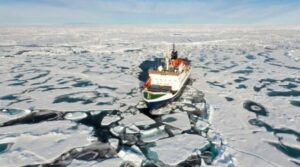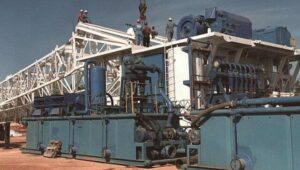The Arctic, with its melting ice due to climate change, is emerging as a new field of geopolitical and economic opportunities. Russia and China have expressed strong interest in developing the Northern Sea Route, a maritime pathway that connects the Atlantic to the Pacific Ocean via the Arctic. Agreements have already been signed, indicating the creation of the “Polar Silk Road.” A recent report by Norway’s High North Center for Business and Governance detailed that approximately 145,000 tons of goods were transported between Russia and China this past summer.
Specifically, in June 2024, the Russian state atomic energy corporation Rosatom signed an agreement with the Chinese shipping company COSCO Shipping. This agreement aims to jointly develop and utilize the Northern Sea Route, reducing cargo transport times between Europe and Asia.
Additionally, during the St. Petersburg International Economic Forum, Rosatom signed a memorandum of intent with the Chinese shipping company Hainan Yangpu NewNew Shipping Co. Ltd. The agreement includes plans to establish a joint venture for designing and constructing high icebreaking-class ships to operate an international container shipping line via the Northern Sea Route (NSR).
Vladimir Panov, Rosatom’s special representative for Arctic development, stated that the company plans to build up to five Arctic-class ships, which will allow the NSR to function year-round.
This collaboration is part of a broader effort to enhance trade routes between Russia and China, aiming to increase the volume of cargo transported via the NSR to 50 million tons annually.
Hainan Yangpu NewNew Shipping Co. Ltd. completed seven voyages through the NSR in 2023, increasing the number to twelve in 2024, underscoring the growing interest in utilizing this route.
Other companies that have expressed interest in using the Northern Sea Route and conducting Arctic research include:
- Two major European shipping liners, Hapag Lloyd and Maersk.
- Novatek: The Russian energy company actively participates in liquefied natural gas (LNG) projects in the Arctic, such as the Yamal LNG project, in collaboration with Chinese companies.
- China National Petroleum Corporation (CNPC): The Chinese state-owned oil company has invested in Arctic energy projects, strengthening its energy-sector cooperation with Russia.
- China National Offshore Oil Corporation (CNOOC): Another Chinese state-owned company involved in Arctic energy projects, contributing to the development of the Polar Silk Road.
- Royal Dutch Shell: The multinational energy company has shown interest in exploring and exploiting energy resources in the Arctic, though its activities are subject to environmental restrictions.
- ExxonMobil: The American oil company has engaged in research activities in the Arctic, although geopolitical tensions and environmental concerns have affected its business ventures in the region.
A commercial vessel traveling between Western Europe and East Asia requires approximately 30 days to complete the journey via the Suez Canal, but only 18 days via the Northern Sea Route.
Overall, the Russia-China collaboration to develop the Northern Sea Route through the Arctic represents a significant development with far-reaching economic and geopolitical implications, influencing global trade routes and power balances in the region.
However, studies highlight challenges such as extreme weather conditions, lack of infrastructure, and environmental risks that must be addressed to ensure the safe and efficient operation of the NSR.
Additionally, reports emphasize that the development of the NSR requires international cooperation and investments in technology and infrastructure to ensure the sustainability and safety of transportation in the region.
Ask me anything
Explore related questions





